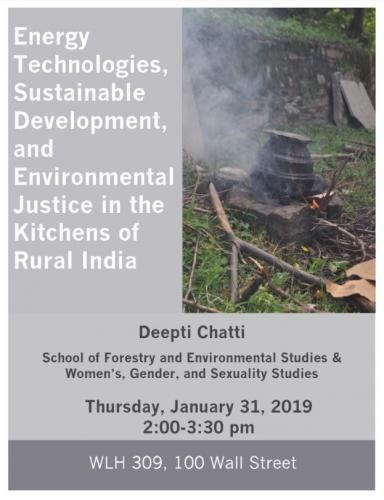
January 31, 2019
Cooking energy technologies of low-income families in the Global South have drawn the attention of development actors for decades. “Traditional” cookstoves are seen as smoke generating machines causing dangerous household air pollution. Motivated by concerns about health, climate change, deforestation, and women’s empowerment, development organizations attempt to facilitate a “clean” energy transition in rural Indian kitchens. Based on multi-sited ethnographic fieldwork with rural Indian cooks, US-based energy technology experts, public health professionals, and climate change researchers, this talk analyzes the contestations over what “clean” cooking energy technologies are, and examines debates about which forms of development are sustainable for families in India. I contrast the technological anxieties of global energy experts with the everyday lived experiences of families in the Indian Himalayas. While energy experts are mired in debates about whether burning fossil fuels for the improved health of low-income families is environmentally just and developmentally sustainable, rural Indian women are making everyday energy decisions based on multiple other factors. These include feeding their human and non-human family, and balancing their activities, time, and labor to lead materially and spiritually enriched lives.
My research shows that low-income Indian families are viewed both as victims of poverty needing global technological expertise, and perpetrators of climate change needing to become more responsible global citizens. This multi-scalar research project examines the promise of modernity entangled with energy projects, and centers the kitchens of low-income families in India to deepen our understanding of how environmental justice concerns manifest in postcolonial societies.
My research shows that low-income Indian families are viewed both as victims of poverty needing global technological expertise, and perpetrators of climate change needing to become more responsible global citizens. This multi-scalar research project examines the promise of modernity entangled with energy projects, and centers the kitchens of low-income families in India to deepen our understanding of how environmental justice concerns manifest in postcolonial societies.
Event time: Thursday, January 31, 2019 - 2:00pm to 3:30pm
Location: WLH 309